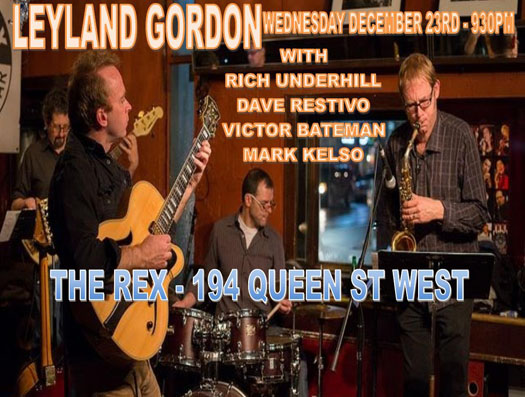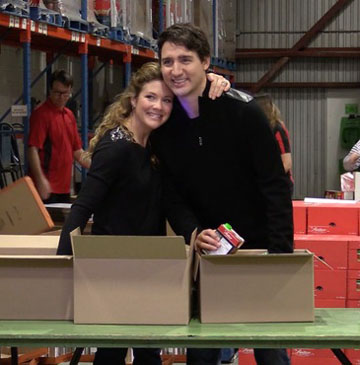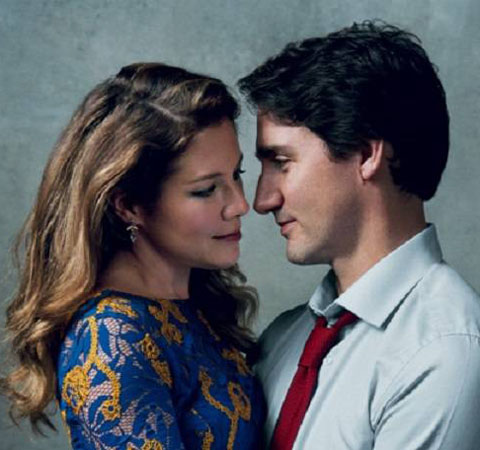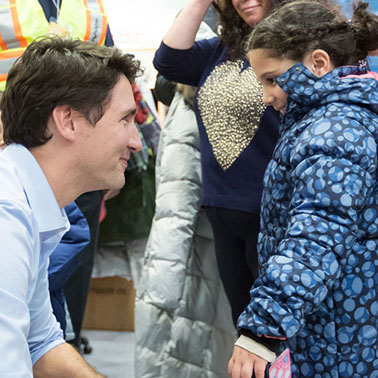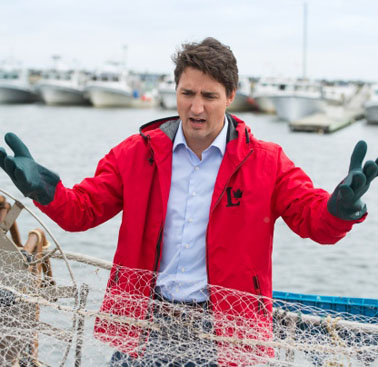Justin Trudeau is more like Bill Clinton than Ronald Reagan .. see “electoral reform” (and Nathan Cullen too)
Dec 22nd, 2015 | By Randall White | Category: In Brief
As the poignant year 2015 draws to a close. Justin Trudeau has only been Prime Minister of Canada for, oh say a month and a half or so – since this past November 4. But we seem to have seen and heard a lot from him already.
Craig Oliver at CTV News recently suggested Prime Minister Trudeau II (the younger?) may be saying and/or doing too many things in the public eye. And that may be right.
The other day Justin and Sophie were helping out at a Montreal food bank. (Although it should be noted that New Democrat leader Tom Mulcair also appeared at another Montreal food bank.) And then there was Vogue magazine, welcoming refugees (several times?), etc, etc.
Related legends of a great communicator have inspired talk about Justin Trudeau as a grandchild of Ronald Reagan in the great democratic republic to the south. But can anyone seriously imagine Ronald Reagan even pretending to help out at a Los Angeles food bank?
A few nights ago, just after a dynamic debate at a local jazz and blues bar somewhere in the rest of Canada, a more apt comparison came to mind. The recent US president who Justin Trudeau most resembles is William Jefferson Clinton, especially as finally revealed by John Travolta in the movie Primary Colors.
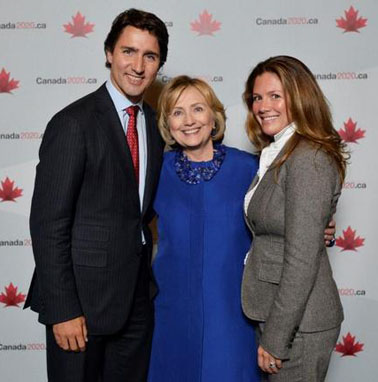
From Justin Trudeau’s Twitter account, October 2014 “Tout un honneur et un réel plaisir d'avoir rencontré @HillaryClinton cette semaine.”
Well … again, there are some things that don’t quite fit … Â President Bill Clinton was a policy wonk, in a way that Justin Trudeau is not, etc.
And then Sophie Gregoire-Trudeau, as formidable as she so wonderfully is, does not exactly  resemble Hillary Rodham Clinton, who is herself running for president in 2016. (Although you might reasonably wonder : could Sophie finally run for Canadian prime minister too, further down the road?)
There is nonetheless something useful about some rough-hewn northern-woods analogy between the younger Trudeau and Hillary’s older husband.
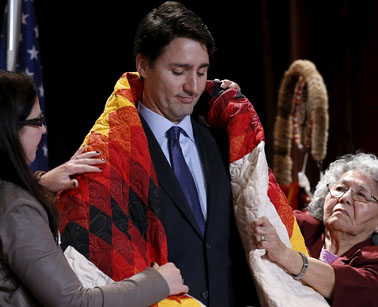
Prime Minister Justin Trudeau is presented with a blanket after addressing Assembly of First Nations in Gatineau, Quebec. Photograph: Chris Wattie/Reuters.
The Clintonesque Justin Trudeau, for instance, peers out from between the lines of Joan Bryden’s report on the new prime minister’s “75-minute interview with Canadian Press reporters in Ottawa on Thursday,” December 17.
(See the version in the Toronto Star : “Trudeau says electoral reform will strengthen democracy, not favour Liberals.” And note as well Althia Raj’s December 21 report on the Huffington Post Canada interview with the always interesting MP for Skeena–Bulkley Valley in northwestern BC : “Nathan Cullen, NDP’s Democratic Reform Critic, Backs Referendum With A Twist.”)
1. Justin Trudeau’s high-minded electoral reform crusade
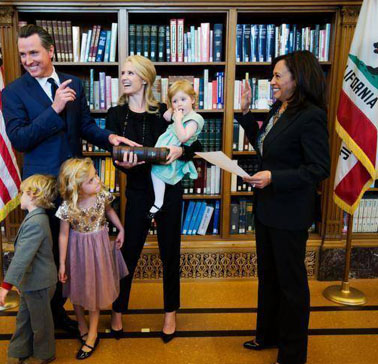
Our technical support staff, currently in Hawaii but with much Bay Area experience, has urged that California Lieutenant Governor Gavin Newsom has things in common with Canadian Prime Minister Justin Trudeau. Here Mr. Newsom is with his family, being sworn in for a second term as California LG in January 2015. He will be running for Governor of California in 2018.
As noted, the Toronto Star has coyly posted Ms Bryden’s work under the headline : “Trudeau says electoral reform will strengthen democracy, not favour Liberals.” And her December 17 report focuses on this theme.
What she calls the “newly minted prime minister [’s] … most detailed explanation yet of his thinking on electoral reform” strikes me as most notable for two key features.
The first is Justin Trudeau’s ability to set near-Machiavellian subjects of this sort in a context of high-minded moral crusade
In this electoral reform case, Ms Bryden tells us, “he says he wants a system that makes the country’s democracy stronger,” because “I’m in this job to try and make a significant, positive difference in people’s lives.”
The younger Mr. Trudeau goes on “It would be easier to do nothing and sit back and just say, ‘OK, you know what, this worked for us, I think we can make this current system work for a few more mandates’ . . . But that’s not the kind of leadership that Canadians expected.”
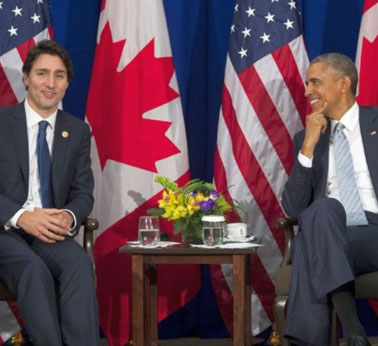
Earlier this month the White House announced that President Barack Obama will hold a formal state dinner for Prime Minister Justin Trudeau early in the new year – “a lavish honour that the Obama White House has extended to only a small, select group of world leaders” (China, Japan, France, UK, South Korea, Mexico, and India). The “last White House state dinner for a Canadian leader was in 1997, when President Bill Clinton hosted Prime Minister Jean Chretien.”
Ms Bryden’s piece ends with an almost dramatic climax in this direction :
“Trudeau said the real question that needs to be answered is: ‘What kind of political discourse do we want to have in Canada?’…
“Canadians need to have a ‘mature discussion’ about various electoral systems and their potential for such things as producing stable governments or more collegial politics with less partisan conflict … ‘Deciding what kind of country we are and what kind of system would suit us is actually a pretty exciting thing’ ….”
2. Continuing Liberal faith in preferential or ranked balloting
Wow! You might reasonably say, at first blush.
Yet the second exciting thing that stands out here is the newly minted prime minister’s parallel ability to finally reduce the practical politics that flow from his high-minded premises to something that does finally work for the historic higher mission of the Liberal Party of Canada.
In the end, the only practical approach to electoral reform that makes serious sense to Prime Minister Justin Trudeau is still so-called preferential or “ranked balloting” – where the second as well as first choices of voters (and conceivably even third and so-on) have more impact.
This would in fact seem to push our political discourse more toward the centre ground that the Liberal party has traditionally occupied (since the First World War at least!).
Or more voters put Liberals as their second choice than either Conservatives or New Democrats. More exactly, as Althia Raj at Huffington Post Canada has explained in her recent reporting on the subject : “A preferential, or ranked, ballot might benefit the Liberals. A Nanos poll released a few days before voting day suggested the Liberals were the preferred second choice of both Conservative and NDP supporters.”
I am not so cynical myself to believe this means that the Justin Trudeau Liberals will be quite brazenly using their current parliamentary majority to introduce ranked balloting electoral reform in time for the next election in the fall of 2019. As Prime Minister Trudeau himself might say, “that’s not the kind of leadership that Canadians expected” either.
Besides, the Liberal policy on these matters has been clear for some time. And as Joan Bryden has most recently explained, according to Prime Minister Trudeau,“the shape electoral reform ultimately takes won’t be entirely up to him.”
Ms Bryden goes on : “Canadians will be ‘broadly consulted’ by a special all-party committee that is supposed to recommend a replacement for FPTP [our current First-Past-The-Post electoral system] within 18 months. He did not rule out an eventual referendum on the matter, although that route has killed electoral reform initiatives in three provinces.”
3. All-party parliamentary committee strategy
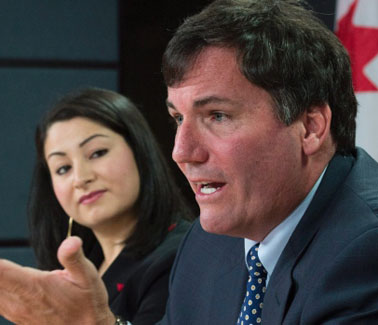
“Minister of Democratic Institutions Maryam Monsef listens to Government House leader Dominic LeBlanc as he responds to a question during a news conference in Ottawa, Thursday December 3, 2015.” (Adrian Wyld/Canadian Press.)
So … I think Justin Trudeau (and his apparent point people on this file, Dominic LeBlanc from New Brunswick and Maryam Monsef from Ontario) will press ahead even vigorously with this all-party parliamentary committee strategy. And wouldn’t it be nice if we actually could have a “mature discussion” about electoral systems in Canada today? And maybe we can, for a while?
But isn’t it still clear from the start that, at least as the ground is currently arrayed, there is no one particular kind of electoral system on which all three parties can be expected to agree?
The Conservatives think they are best off with the (“FPTP”) system we have now, and they are almost certainly right. The Conservative Party of Canada bequeathed by Mr. Harper will not do well in a new electoral system that moves practical politics closer to the centre.
The New Democrats will do best under some form of more pure system of proportional representation, where percentages of seats in parliament more or less directly reflect percentages of the cross Canada popular vote. From at least one angle, this also seems the most democratic approach at first glance.
The Liberals’ objections to more pure forms of proportional representation are nonetheless tidily expressed by Prime Minister Trudeau in Joan Bryden’s December 17 report : “Trudeau said he feels ‘very strongly’ that a reformed electoral system should not weaken a member of Parliament’s connection with and accountability to constituents in a specific riding.”
As the Prime Minister himself went on : “The fact that every single politician needs to earn the trust of a specific group of constituents who cover the broad range of Canadian public opinion strengthens our democracy … I’m wary of disconnecting any MPs from specific groups of citizens or geographic location. I think that’s one of the strengths of our parliamentary system and as soon as you get into lists by parties or groups [as in any more pure form of proportional representation] you have people who owe their election to the House of Commons to a partisan organization rather than to a group of Canadians.”
4. Nathan Cullen and the fresh prospect of at least some ultimate Liberal-NDP compromise on electoral reform ????
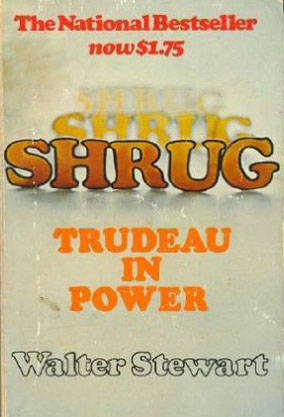 Until quite recently, my own sense of what all this added up to was an ultimately deadlocked all-party parliamentary committee – followed by an effective shelving of the electoral reform issue.
Until quite recently, my own sense of what all this added up to was an ultimately deadlocked all-party parliamentary committee – followed by an effective shelving of the electoral reform issue.
Action would only be possible if the Liberal government went alone, via its parliamentary majority (but not supported by 60% of voters in this past October 19 election, etc, etc). Prime Minister Justin Trudeau would (quite rightly) see it as political suicide to go ahead with any kind of electoral reform on this basis, and finally shrug his shoulders in the high style of his father.
(Who still remembers the early 1970s book by Walter Stewart, Shrug : Trudeau in Power? Almost no one today, certainly under 60 years old, but … it is still a part of the old story … )
Another intriguing possibility has now cropped up, however, in Althia Raj’s December 21 report on the Huffington Post Canada year-end interview with the always interesting MP for Skeena–Bulkley Valley in northwestern BC. (See : “Nathan Cullen, NDP’s Democratic Reform Critic, Backs Referendum With A Twist”).
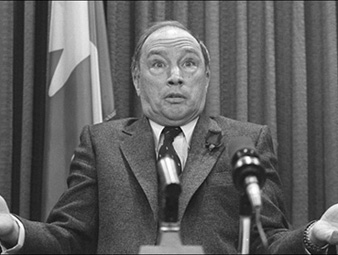
“OTTAWA, JAN.30—NOT WORRIED—Prime Minister Pierre Trudeau shrugs during his Friday news conference in Ottawa. Trudeau said he expects the British Parliament to go along with patriation of the Canadian constitution and he has Prime Minister Thatcher’s word on it. (CP PHOTO) 1981 (Stf-Peter Bregg).” And we here in 2015 can only hope Justin Trudeau has his father’s same capacity to shrug when it’s called for, in the real world of politics!
Much of what Nathan Cullen has to say makes a refreshing kind of out-of-the-box common sense. Â As in : “Often when you present somebody with something new versus old, if they are not totally sure about the new thing, they will just naturally defer to [the] status quo …So I lean more towards a referendum once people have tried a new system out for an election or two. I think that makes more sense. And so if it is not getting the result or not performing the way that they’d hoped, they would have an opportunity to go back to first-past-the-post.”
Or, as Ms Raj has further explained  : “Cullen said he thinks all parties need to take a step back from their specific preferred choice and agree to some ‘tests or principles’ that the new voting system needs to meet to avoid potential ‘partisan bickering.’”
This could almost sound like the beginnings of a “mature discussion” about “What kind of political discourse do we want to have in Canada?”
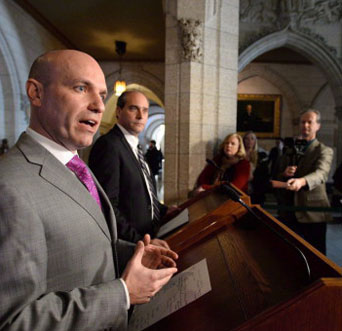
Nathan Cullen speaks to reporters in foyer of Canadian House of Commons. (Photo: Sean Kilpatrick/CP).
And it at least makes me wonder if there may actually be some prospect of an eventual compromise position on electoral reform that both Liberals and New Democrats could agree on. (Which would still be open to the broad political objection that the Conservatives continued to disagree, but would at least have the support of political parties voted for by 59% of the active Canadian people in the last federal election!)
It may of course be that there is no serious prospect of any such thing. Emotions are still too close to the surface over who knows exactly what happened on October 19. Â And so forth.
Reading about Nathan Cullen’s refreshing words of wisdom, four days from the arrival of Santa Claus, has nonetheless nourished my delusion that the next 18 months on Canadian federal electoral reform just might be more interesting than I have personally been imagining up to now! And what better way to say happy new year to everyone who voted on October 19 (and all those world travellers and others who could not but wanted to, in their hearts of hearts etc)
